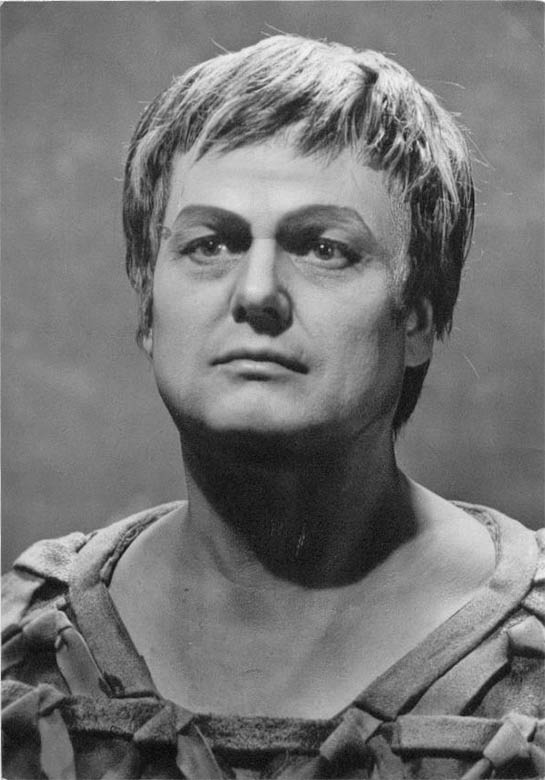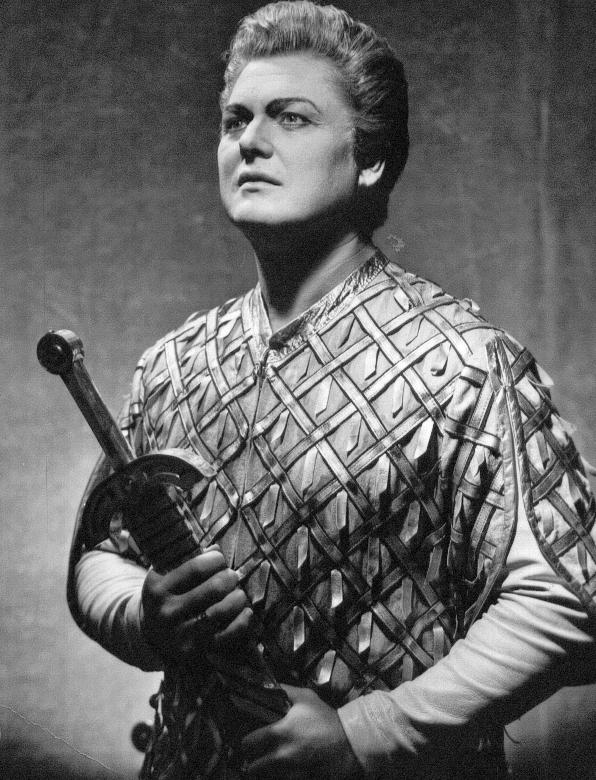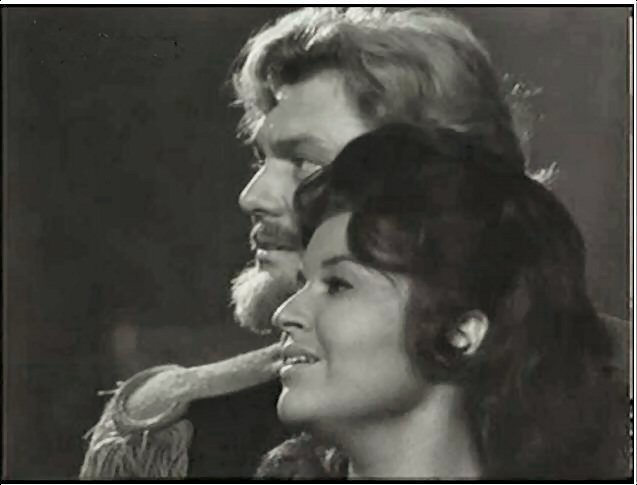Jean Cox
16 January 1922 Gadsden, Alabama – 24 June 2012 Bayreuth
 |
 |
| Parsifal | Lohengrin |
 |
 |
| Die Verlobung von Santo Domingo |
Cox was born in Gadsden, a town in the southern United States. His parents Kell and Nell Clark Cox encouraged his vocal talent.
During the Second World War, he served as a pilot in the U.S. Air Force.
After the war, he studied singing, first
with William Steven at the University of Alabama in Tuscaloosa, where he received the Bachelor of Music. More constructive
studies then followed with Marie Sundelius at the New England Conservatory in Boston. After two years of study, Cox graduated with a
Master of Arts with honors.
In 1951, his stage debut was at the New England Opera Boston as Lenskij. He was awarded
a Fulbright scholarship to study in Rome with maestro Luigi Ricci. In 1954, he sang Rodolfo at the Spoleto
Festival. Cox remained in Europe, where he began his career at various opera houses.
Privately, he studied in Munich with Max Lorenz.
During the season 1954/55, he was hired as a lyric tenor by the Kiel Opera.
In the provinces, he first sang many lyric-dramatic roles, including the title role of Serse, Cavaradossi, Števa,
Matteo and Lyonel. An engagement at the Staatstheater Braunschweig followed (1955–1959), where
he first sang the title roles in Lohengrin and Otello.
Mannheim
In 1959, he was hired by the National Theatre Mannheim. He was there without interruption for nearly 40 years as a permanent member.
His debut at the National Theatre Mannheim was as Alfredo. During his career, Cox sang
in Mannheim almost all the tenor repertory both for lyric tenor and heldentenor. In Mannheim,
Cox developed continuously,
starting with the Italian roles to the heroic tenor roles. His repertory included: Rodolfo, Duca, Radamès, Calaf,
Max, Otello, Florestan, Wagner roles, ...
In 1977, the city of Mannheim appointed Cox as Kammersänger.
Later in his career, Cox changed to
character roles. In 1989, he sang Captain Vere at the National Theatre. In 1996 he took, at the age
of 74, his last performance as Aegisth.
Bayreuth
Already in 1956, he first appeared at the Bayreuth festival as Steuermann in Der fliegende Holländer.
From 1967 to 1975, he sang there every year: Lohengrin (1967, 1968), Stolzing (1968–1970, 1974, 1975), Parsifal (1968, 1973),
Erik (1969), Siegfried (1970–1975). In later years,
Cox sang in 1978 as Siegfried (Siegfried), in 1983 Siegfried (Götterdämmerung) and
again in 1984 as Stolzing.
Often, Cox saved a performance at the last minute avoiding a cancellation.
Guest appearances
In 1961, he sang at the Bregenz festival (in Fra Diavolo and in the operetta Die Trauminsel by Robert
Stolz) and at the São Carlos in Lisbon (Pylade in Iphigénie en Tauride).
From 1963 to 1977, Cox sang regularly at the Vienna State Opera. He made his debut there on October 23rd, 1963 as Bacchus. He
appeared in 75 performances, including Bacchus, Apollo, Turiddu, Števa, Sergej
(Lady Macbeth Mtsenskogo uezda), Hoffmann, Erik,
Lohengrin, Stolzing, Parsifal, Siegmund, Siegfried (Siegfried), Italienischer Sänger and Tristan. His last appearance was as Bacchus on
January 18th, 1977.
He sang at the Vienna Volksoper (December 1963 as Carlo Moor in Masnadieri, and Sándor Barinkay),
at the Hamburg State Opera (regularly 1958–1973), at the Lyric Opera in Chicago (1964, 1970 and 1973 as Bacchus,
Siegfried and Erik), the festival of Aix-en-Provence (1966 Bacchus), the Bavarian State Opera (1967, and in
1969 as Siegfried), at the Opéra in Paris (1971 and 1972 as Siegmund), at Covent Garden (1975, debut as
Siegfried), at La Scala (1975 as Siegfried) and at the Met (April 1976, Stolzing).
Cox was married to the opera singer Anna Reynolds. His retirement was spent in a small village near Bayreuth.
There, he taught singing together with his wife.
Reference 1
Reference 2: Kutsch & Riemens
| Jean Cox sings | Ariadne auf Naxos: Bin ich ein Gott, with Régine Crespin, Rachel Yakar, Sonja Draksler and Marie Thérèse Debliqui
|
In RA format
In RA format
In RA format
I would like to thank Tom Silverbörg for the recording (Holländer).
I would like to thank Richard Boijen for the pictures (Parsifal & Lohengrin).
|